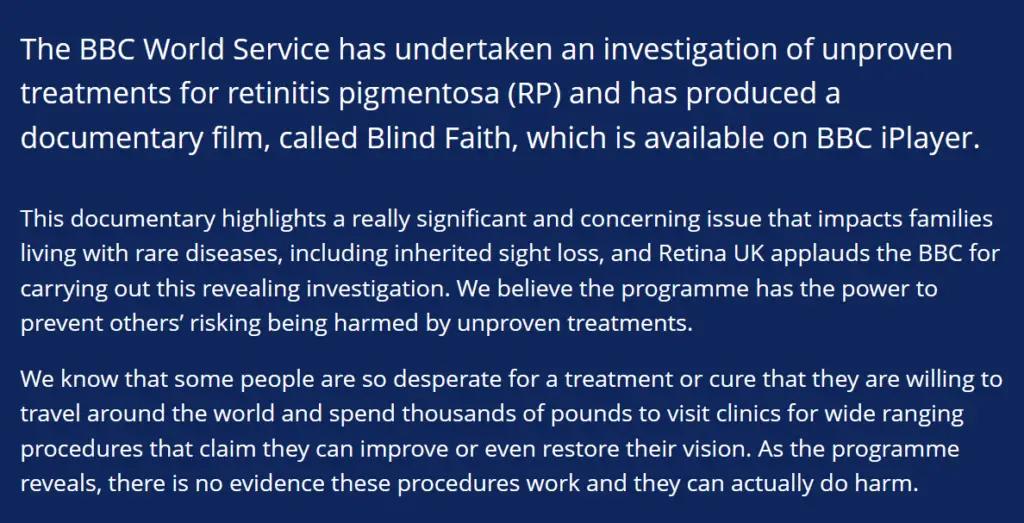Do genetic eye disease ‘treatments’ work? “Blind Faith BBC documentary”
There are currently no licensed therapies or treatments available for the majority of people living with inherited retinal dystophies, but researchers are making progress, and there are a number of genuine, well conducted clinical trials underway across the globe.
The BBC World Service has undertaken an investigation of unproven treatments for retinitis pigmentosa (RP) and has produced a documentary film, called Blind Faith, which is available on BBC iPlayer.
The documentary is readily accessible for viewing on the official BBC website.
This documentary highlights a really significant and concerning issue that impacts families living with rare diseases, including inherited sight loss, and Retina UK applauds the BBC for carrying out this revealing investigation. We believe the programme has the power to prevent others’ risking being harmed by unproven treatments.

Regarding the response within the UK ophthalmic community, the documentary has triggered a resounding reaction. The community grappling with sight loss has voiced sentiments of shock, horror, outrage, and deep-seated anger in response to the blatant exploitation unveiled.
Do genetic eye disease treatments work?

Do genetic eye disease ‘treatments’ work?
An intriguing revelation emerged during the live screening of the documentary at UCL: nearly half of the attending patients acknowledged exploring similar dubious treatments, which ultimately yielded no improvements in their visual condition. This revelation marked a significant breakthrough, as many patients usually refrain from admitting such endeavors due to potential embarrassment and the contradiction with NHS medical recommendations.
It’s crucial to acknowledge that the modern world is interconnected through the internet, fostering a diverse global community where alternative approaches might be shared by friends and relatives residing abroad. The UK, though equipped with a well-regulated ethical framework, is not entirely immune to unscrupulous practices. Despite the presence of NHS experts adhering to evidence-based medicine and regulated clinical trials, patients might opt for unregulated private practitioners.
A pertinent case in point is the instance of ophthalmologist Bobby Qureshi, formerly associated with the London Eye Hospital, who offered costly telescopic intraocular lens implant surgery for AMD, amounting to £24,000. The Macular Society, a prominent UK charity focusing on macular disease, lodged complaints against Mr. Qureshi with the GMC in 2017, substantiated by over 50 phone calls from disgruntled patients. The society suspected Mr. Qureshi of misleading and inappropriate practices, ultimately leading to his removal from the GMC register in 2019.
The documentary “Blind Faith- Do genetic eye disease treatments work?” is poised to serve as an educational resource for patients inquiring about these unscrupulous treatments.
Retina UK, in an article, succinctly states, “There is only one therapy available in the UK, specifically for people living with the genetic diagnosis of RPE65. More information about Luxturna.”
In terms of legality, the question arises whether such treatments or their promises contravene any existing laws.
The mentioned dubious treatments lack the ethical endorsement of clinical trials and falsely promise sight restoration or improvement. The GMC strictly forbids misleading patients about prospects for improvement, and patients are encouraged to report such instances. Since the documentary’s release, some UK patients have been dissuaded from seeking stem cell therapies abroad.
While the documentary focuses on US-based practitioner Jeffrey Weiss, the prevalence of similarly deceptive practices within the UK remains a subject of inquiry. To date, as per Professor Moosajee’s knowledge, such treatments are not accessible within the UK. While certain human retinal progenitor cell trials are underway in the commercial sector, stringent ethical approvals and a research-oriented context guide these endeavors, devoid of unwarranted claims. Professor Moosajee is a distinguished Clinician Scientist and Consultant Ophthalmologist specializing in genetic eye disease at renowned institutions including Moorfields Eye Hospital, UCL Institute of Ophthalmology, and the Francis Crick Institute in London.
A UK-based private intervention involving transcorneal electrical stimulation (TES) with OkuStim has also surfaced, positing itself as a treatment for retinitis pigmentosa with verified safety and efficacy. While varying study outcomes exist, consensus on substantial, long-term benefits necessitates further, comprehensive investigation. The company Okuvision concedes the lack of consistent, clinically relevant long-term effects in current studies. Consequently, claims of ‘treatment’ may be premature, and this procedure remains unadopted by the NHS.
In terms of ensuring the legitimacy of future trials and treatments, the global nature of the issue complicates regulation, requiring adherence to local medical governing bodies. Within the UK, rigorous national ethical approvals and Clinical Trial Authorisations from the MHRA are prerequisites for Investigational Medicinal Product trials (CTIMPs). External audits are mandated to verify adherence to protocols.
To conclude, in light of this story, what precautionary advice can you offer those seeking treatment to retinitis pigmentosa or other related sight issues?
A Take home message is this: patients must discuss any treatments they come across with their ophthalmologist before embarking on what could be an unethical, unsafe, costly and potentially harmful procedure. Please watch this documentary and share with others. And finally, alert your doctor, ophthalmologist or sight loss charity helpline if you feel something is not quite right.
More resource: article published by Retina UK
Discover more from An Eye Care Blog
Subscribe to get the latest posts sent to your email.


You must be logged in to post a comment.